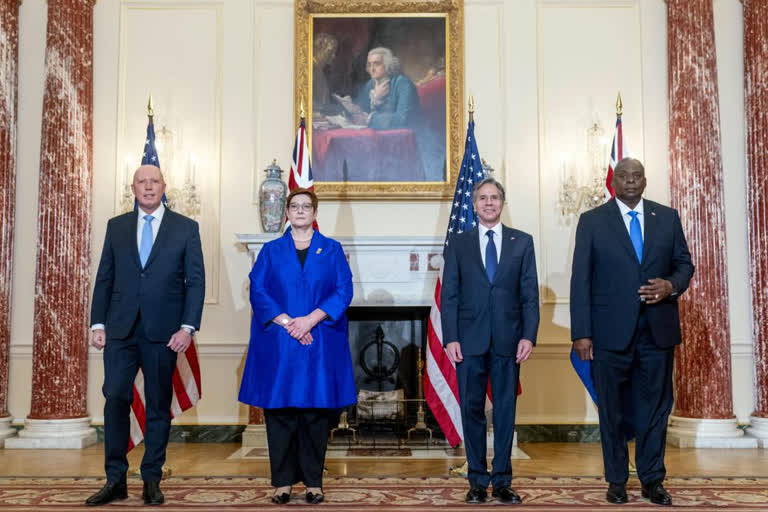New Delhi: The sudden announcement of the birth of AUKUS—a new military alliance jointly announced on Wednesday in a virtual press conference by US President Joe Biden, UK Prime Minister Boris Johnson and Australian Prime Minister Scott Morrison—heralds the beginning of another chapter of US-led strategic moves that position China as the main adversary.
But it is also a tacit acceptance of the fact that the traditional and unavoidable stranglehold that China suffered from—squeezing its ships loaded with containers, cargo, fuel and gas through the narrow Malaccan Straits also referred to as the ‘Malaccan Dilemma’—has lost much of its relevance and strategic importance much to the detriment of the US and its allies.
Energy-deficient and fuel-guzzling China’s spectacular GDP growth and rapid development has made oil and gas an increasingly non-negotiable commodity of import which it buys from strategic partners like Russia and Iran. And it is through the Malaccan Straits that ships carrying these items pass through. Not just the 70 per cent of energy items but 60 per cent of total Chinese trade flows use this route.
But this passage also holds out the spectre of a choking point for Chinese ships. Besides the US, India too—because the Malaccan Straits open up to the Andaman and Nicobar islands—may pose potential threats of a blockade in case of hostilities.
As a result, China had been perpetually on the lookout for routes to avoid the ‘dilemma’—like the China-Pakistan Economic Corridor (CPEC) project which is a flagship project of the ambitious Belt and Road Initiative (BRI) that connects mainland China to the Gwadar port in Pakistan’s Balochistan thereby providing much-needed access to the sea. Meanwhile, China had been looking for more routes.
In that backdrop, the sudden developments of the last six-and-a-half months may have presented a grand opportunity to China to overcome the ‘Malaccan Dilemma’.
The sudden developments in Myanmar and Afghanistan have made the situation very favorable to China to access the Indian Ocean directly.
Myanmar
On February 1, 2021, Myanmar’s military, also called the ‘Tatmadaw’, brought about a coup and taking over the reins of the government at Naypyitaw. Considered very close to Beijing, the development has made Myanmar a sphere of total Chinese influence while weakening Western and Indian interests.
On August 26, 2021, China inaugurated a vital rail that connected the commercial and military nub of Chengdu to the border town of Lincang, located just opposite the border town of Chin Shwe Haw, in Myanmar’s Shan State, virtually completing a sea-road-rail link that connects Singapore to Chengdu.
Goods will arrive from Singapore in ships to Myanmar’s Yangon port, from where, after traversing a good part of Myanmar by road, will reach Lincang in China’s Yunnan province via Chin Shwe Haw, before setting off on direct rail to Chengdu.
Also Read: Behind how Qatar became a key player in Afghanistan
Besides shortening the shipping time from Singapore to Chengdu by a good 20 days, more significantly, the new link will enable China to carry out international trade directly from the Indian Ocean onwards with West Asia, Europe and the Atlantic region.
Already a 770-km-long parallel oil and gas pipeline runs from Myanmar’s Kyaukphyu island in the Bay of Bengal to Ruili in Yunnan province and later extends to Guangxi after a 2,800-km-long run.
Another progressing major Chinese infrastructure project that is also a part of the China-Myanmar Economic Corridor is the link between the deep sea-port in Kyaukphyu in Rakhine with China’s southwestern Yunnan province.
Afghanistan
On August 15, 2021, the Taliban captured power in Afghanistan capital Kabul after a series of blitzkrieg-like advances against the government troops in the conflict-ridden country. The Taliban considers China among its closest allies, which China has reciprocated with considerable largesse.
The warming relations between the two will ensure fast completion of the 50-km-long road link between Afghanistan and China which as of mid-June 2021 was approximately 20 percent complete.
The road begins at Bozai Gumbaz, at 3,840 metres, and will pass through the 4,923-metre-high Wakhjir pass, one of the two access points along the about 90-km-long border between China and Afghanistan, before opening up in the Chalachigu or Kara-chukur Valley in Kashgar Prefecture, Xinjiang, China.
This road will be in proximity of the CPEC project that runs across Pakistan-Occupied Kashmir areas which finally connects to Gwadar port. It is quite likely that these two projects will be linked in the very near future giving China another route to connect to the CPEC and finally to the Arabian Sea.
Besides aiding China to exploit the rich mineral and rare earth resources of northern Afghanistan including graphite, the connectivity will also provide China access to the famed fuel and energy riches of Central Asia.
Which is why the US sought to create a multilateral alliance against China—like AUKUS.
Says Prof Kumar Sanjay Singh, a political and strategic analyst who teaches history at a Delhi University college: “The timing of the announcement of AUKUS is a product of three major developments. The first is China’s new land routes to the Bay of Bengal and the Arabian Sea. Which means that the traditional deterrents which the US had of keeping Chinese influence from spreading across the Indian Ocean are gone.”
“Second, because of the US' weakening footprint in the Indian Ocean along with its rapidly declining influence in West Asia, the ability to control trade in the Indian Ocean is getting compromised in a very big way. With China building up its naval capacity there is a challenge which is at hand.”
“Third, the limited strategic initiative that US President Joe Biden has up his sleeve vis-à-vis China. This is why a credible challenge to expanding Chinese influence was felt.”
AUKUS may therefore be considered the first response to China’s sudden ability to overcome the ‘Malaccan Dilemma’. Importantly, the implications of these developments should not be lost on India which will be significant.
Also Read: Kabul airport bomber rented Delhi flat, studied engineering


